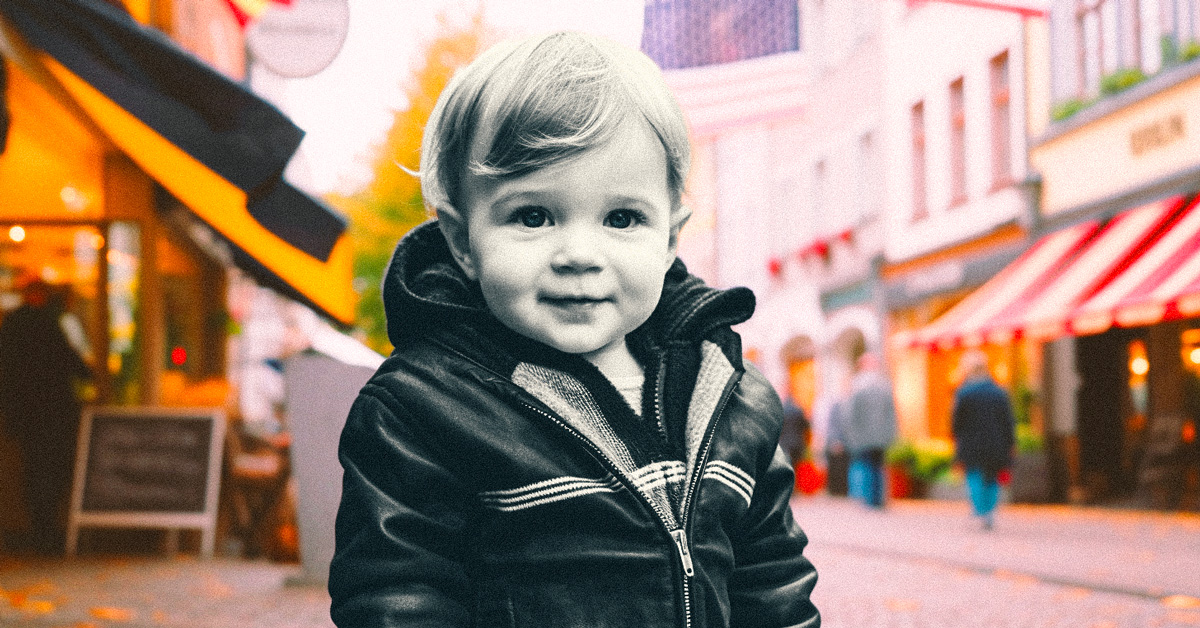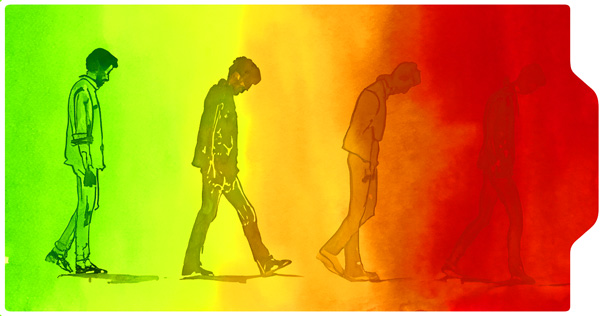When my husband and I moved to Germany for his post-doctoral degree, our plans admittedly did not include getting pregnant, having a baby, and then raising our new child into toddlerhood in a new country. We envisioned ourselves catching cheap flights on the weekends to neighboring countries, savoring new tastes, and taking in new sights and cultures.
However—*record scratch*—I became pregnant within a month of our arrival.
It was a happy surprise, to be sure. Yet we wondered how this change would affect our experience in a new country.
But this turn of events began a far more intimate and rich cultural experience of our new home than we could have imagined, leading us to learn and embrace a new parenting philosophy that has shaped how we’re raising our daughter.
The German parenting philosophy
First, a caveat: This article outlines my experience and impression, which was likely influenced by where I lived, my own cultural background, etc. I will say “German parenting philosophy” in broad terms, but of course, there are exceptions everywhere, and my experience will not necessarily reflect what another expat parent might experience, or what Germans themselves might describe as their parenting philosophy.
That said, to me, the “German parenting philosophy” appeared to permeate the entire culture. Teenagers, the elderly, young adult professionals without kids, even the intimidating German government itself—everyone seems to respect this philosophy, and its implicit rules.
The effect for me as a pregnant woman, and then as a young mother, was profoundly comforting, and challenged and changed some views I had held about raising children from my personal experience with American parenting culture.
Before my daughter was even born, I began observing parenting differences. Early on in my pregnancy, I met a fellow American expat mom at a coffee shop, to pepper her with questions about what it’s like to give birth in a German hospital. Near us, a mother with a young toddler was meeting one of her girl friends, and I watched as the little boy began to climb his stroller, which was parked next to their table.
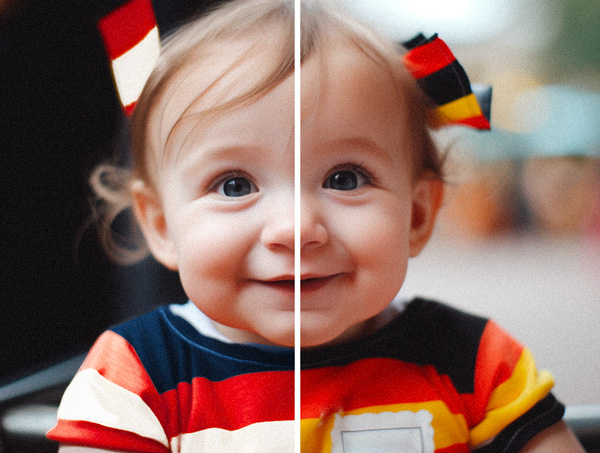
I expected a panicked warning from his mother, and for him to be admonished for his attempts, but instead, his mother simply said, “Oh! You’re climbing!” and steadied the stroller. Her friend wordlessly assisted with keeping the stroller upright, and they stopped their conversation while they watched him carefully climb.
Once he reached the top, they both cheered his success as he beamed with pride. They continued to hold the stroller as he carefully climbed back down, and then simply resumed their conversation while he quietly moved on to another playful exploration.
It was at that moment that I knew parenting in Germany would be different, and I was ready to learn. Reflecting back on my experience, I noticed five key lessons about what makes parenting different in Germany, and important distinctions between American and German parenting culture.
Taking big risks is healthy, and important
From the stroller example above, you might have already guessed this: Germans are comfortable, even encouraging, of small children taking big—potentially dangerous—risks.
One of the playgrounds we loved to visit with our toddler had this rope structure, which is probably two stories tall, and accessible to any child determined enough to reach it.

If a child fell through any of the sizable holes in the net, only a thin layer of sand below would cushion their fall. Parents typically sat far away in lawn chairs on the grass, chatting, while periodically waving or smiling at their child’s climbing efforts, with minimal to no “hovering.”
The German way of thinking on allowing children to do dangerous things is that children know and understand that they’re pushing the limit, so they’re more focused and careful during the activity, and therefore more safe.
In fact, a growing number of German educators and town planners are actually demanding that playgrounds be built with more risk and danger involved, believing that it’s important for children to experience real-world repercussions, in what is still a relatively controlled environment.
I always aimed to allow our daughter to take more risks, but German parents showed me that children were capable of taking even greater risks that I had assumed might be possible. Our daughter has incredible climbing and balancing skills, and greater confidence in general, thanks to many hours on German playgrounds that encouraged big, daring types of play.
Let little children be little children
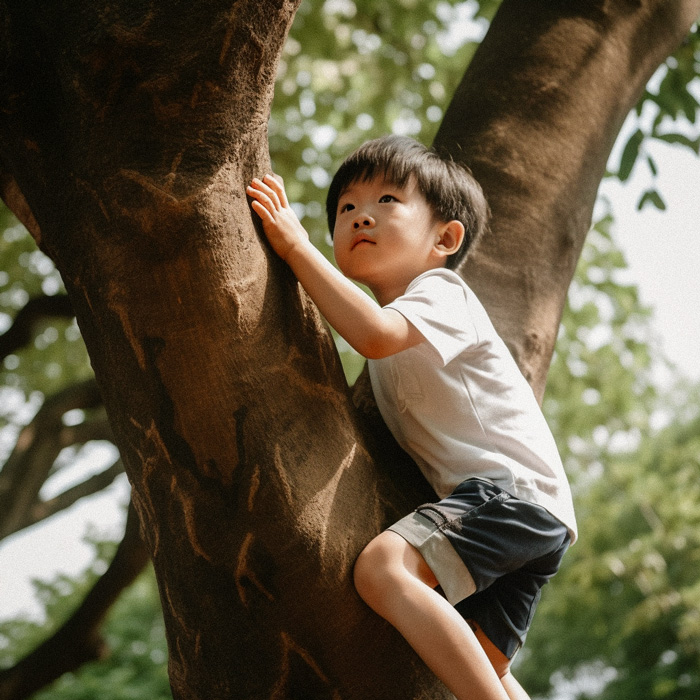
Before the ages of about 7 or 8, little kids are given loads of leeway for playing, or simply practicing their social and physical skills, in public spaces.
When my daughter was learning to walk, I would set her down on the sidewalk and encourage her to toddle. Once, she began to weave on her unsteady little legs from left to right across the entire sidewalk, unintentionally (and repeatedly) preventing a couple from passing her.
I quickly scurried over and guided her to one side so they could pass, and apologized for the inconvenience.
They looked at me with confused smiles. “Aber das ist in Ordnung?” (Basically, “But this is normal/to be expected?”) They couldn’t understand why I was apologizing.
This attitude of giving lots of grace and understanding toward little learners was widespread. Unless a child was being destructive or intentionally obnoxious, Germans were either ready to fully overlook, or even stop and smilingly admire, as children played and showcased new skills, from toddling and cooing, to collecting new “treasures” and conducting little “experiments”—even in public spaces.
For parents, it’s reassuring to be certain that your child’s efforts to learn are seen positively and with understanding, even by strangers. Now, I make greater efforts to show other parents that I’m not bothered by their child’s attempts to learn and grow, even if I’m temporarily inconvenienced. Also, I check myself before I rush to minimize my daughter’s normal, age-appropriate learning behaviors when we’re in a public space.
German dads get to be more involved in the raising and care of their children
First, let me give a huge shout-out to Millennial dads in the US, who are more-involved fathers than perhaps any previous generation.
In fact, Millennial American fathers are also more likely to say they want to be more involved with their children’s lives, but cite work obligations as the primary obstacle.
However, German fathers are granted generous parental leave allowances (up to three years), which I noticed had a significant and positive effect on the bonds between fathers and their children, fathers’ confidence in taking care of all aspects of taking care of their children, and greatly reduced stress levels and pressure on German mothers to “do it all,” because their partners were able to be a large part of caring for the child.
I saw dads pushing baby strollers on their way to an errand, baby bags strapped to their backs, and even a group of guy friends drinking at a Biergarten during the afternoon, joking and entertaining the baby one of the fathers had brought along for bonding time.
It highlighted to me the importance of not only fighting for maternal leave for new mothers in the US, but also fighting for paternal leave for new fathers.

I walked away from my experience in Germany feeling that I had seen clear benefits from policies that encourage family bonding and parental connection to newborn children, and the importance of not forgetting fathers in the fight for parental leave allowance.
“No such thing as bad weather, only unsuitable clothing.”
This quote, attributed to the late British naturalist Alfred Wainwright, has been embraced by outdoorsy parents across the UK and Europe, and Germans were no exception.
Barring a lightning storm, German children seemed to be encouraged to play outside every day, in almost any weather. They have an extensive wardrobe for different weather conditions: Matschhose (softshell coveralls), Gummistiefel (rain boots), Regenjacke (rain jacket), Mütze (beanie), and more.
This mindset and accompanying wardrobe creates more opportunities for outdoor play, and fewer excuses like, “It’s raining outside today, so we can’t go anywhere.” Even on hot summer days, Germans find ways to beat the heat outside, as their homes typically don’t have A/C.
Water playgrounds (Wasserspielplatz), swimming in pools and rivers, and sipping cool drinks under the shady trees of a Biergarten while kids played nearby—getting outdoors was easy and expected, so Germans were careful to cultivate weather-appropriate venues and activities.
In winter, after layering your clothes and wearing proper cold-weather accessories, you could enjoy ice skating, sledding, and Christmas markets, depending on the month.
Growing up in rural Texas, I played outside for many hours most days, but had ignored or neglected my natural desire to be outdoors for many years after graduating college and entering the workforce.
Determined to help my daughter enjoy a similar nature-filled childhood, she and I took up the 1,000 Hours Outside Challenge last year, which encourages parents and caregivers to spend at least 1,000 hours outside with their children over the course of a year, in all seasons.
We didn’t reach our goal, but that wasn’t the point: We made memories while exploring the outdoors, and I watched my daughter blossom with confidence as she mastered climbing skills, learned the joys of dropping rocks in rivers, splashed in puddles, and picked flowers. And I learned better skills about dressing for any weather.
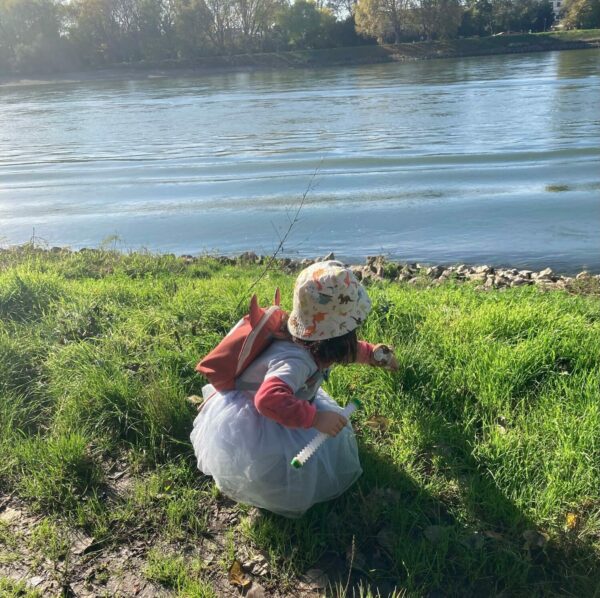
While many places in the US excel at providing opportunities for families and communities to be outdoors, I’m grateful that the first formative years of my daughter’s life were in Germany, where having a community of like-minded parents helped me recenter my goals of giving our daughter a nature-based childhood, no matter the weather.
It takes a village—and an army of nosy Omas who are SURE your child will immediately freeze to death if they’re not wearing a hat during winter—to raise a child
Despite having a reputation as being unfriendly, Germans are generally very kind, and I was deeply touched by the number of strangers who went out of their way to help me, a young mother, and my baby daughter.
During those inevitable moments when I was running errands while my daughter was perhaps too tired and wanted to be home, she would (understandably) burst into tears, and my efforts to comfort her would be fruitless.
Many times an elderly German would appear by her side, gently take her hand, and begin speaking soft words of encouragement and comfort, assuring her that she would go home soon, mommy and daddy would be there, she could sleep, and everything would be OK.
To my amazement, my daughter would settle down, sniffling back little tears, clearly feeling better. I was always grateful for the kindness, gentleness, and patience shown to my daughter, and the compassion these strangers showed to me, an inexperienced young mother far from her own family, to step in and help out.
And yes, I even felt grateful for the nosy little German Omas who seemed to materialize out of thin air if I dared to walk outside into the cold weather without first putting a hat on my daughter’s poor little head.
Even their stern “Das Wetter ist kalt! Wo ist ihr Mütze?” (“The weather is cold! Where is her hat?”) admonitions reminded me that I had an entire German grandparent army behind me—one of the many features of German parenting culture that was surprisingly comforting, and a welcome cultural experience in my new home, to this Ausländer.



